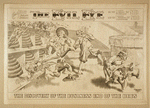A month after turning forty-five, every last egg in her body is a Rockette doing the can-can. Use me use me use me, they cry, I’ll be the easy child, the I-won’t-wake-you-up-in-the-night child. Wasn’t she through with all that – after years, on streets, in restaurants when all she saw were schlepping, wrung out, haphazard, misbuttoned mothers pushing strollers loaded with groceries, a dreadful toddler riding shotgun?
Now every city block boasts the popular miracle of children’s faces. Keep away, she says to civilized men who stop at crosswalks, Do you see this glittered fertility, this fishnet stocking hunger?
The possible calls and the body lunges – rapacious – for what? – every last urgency to be the body?
--Victoria Redel, "Suddenly" just published in Granta (2010) [Follow link].
A very interesting vignette that explores the physical origins of what we might suppose are merely psychological urgings. Redel's piece does not offer the sentimental rendering of last chances that we might expect, but instead, leaves us to contemplate what one becomes when one is no longer a "productive" body. Can one pass this threshold without a "lunge" ---smoothly, gently, oblivous?






